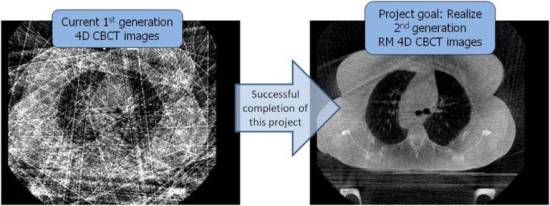Improved 4D CBCT image acquisition
The problem to be solved
Lung cancer is the leading cause of cancer death worldwide. Better targeted radiotherapy will improve treatment outcomes: a 1-Gy increase in tumour dose results in a 4% improvement in survival and a 1-Gy decrease in lung dose results in a 2% reduction in pneumonitis. To achieve tumour dose increase and lung dose decrease, image-guided radiotherapy methods need to be improved.
An image-guidance method to account for lung cancer motion during each treatment session is 1st generation four-dimensional cone beam CT (4D CBCT). However, in the current implementation there is no communication between the respiratory signal and image acquisition. This results in poor image quality which limits its clinical utility.
Goal
To overcome the problem of 1st generation 4D CBCT, our goal is to develop and investigate a 2nd generation respiratory modulated (RM) 4D CBCT system. The innovation is the respiratory signal actively controls image acquisition resulting in improved image quality and / or reduced imaging dose from in-room CBCT image guidance at the time of treatment.

Aims
- Optimize image acquisition parameters and quantify the improvement in image quality and the reduction in imaging dose with RM 4D CBCT.
- Apply the RM 4D CBCT technique to existing patient image data in a simulation study.
- Develop and investigate a clinically usable RM 4D CBCT prototype.
Outcomes
Successful completion of this research will improve the science and clinical practice of lung cancer radiotherapy. RM 4D CBCT, in conjunction with novel algorithms in cone-beam image reconstruction, will enable (1) identifying and targeting primary lung tumours and positive nodes, (2) identifying and avoiding critical structures, (3) reducing false positives and false negatives, (4) facilitating online corrections and adaptive radiotherapy strategies, (5) reducing margins and (6) facilitating online functional avoidance.
Significance
This research will ensure Australia is at the forefront of technological developments and clinical improvements as the 4D CBCT technique is adopted into clinical cancer centres worldwide.

